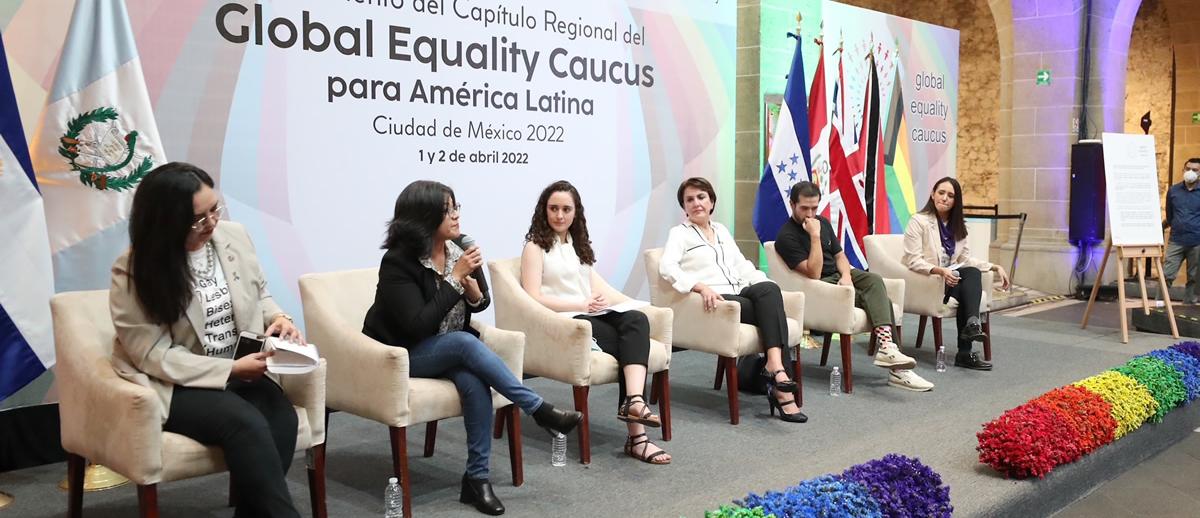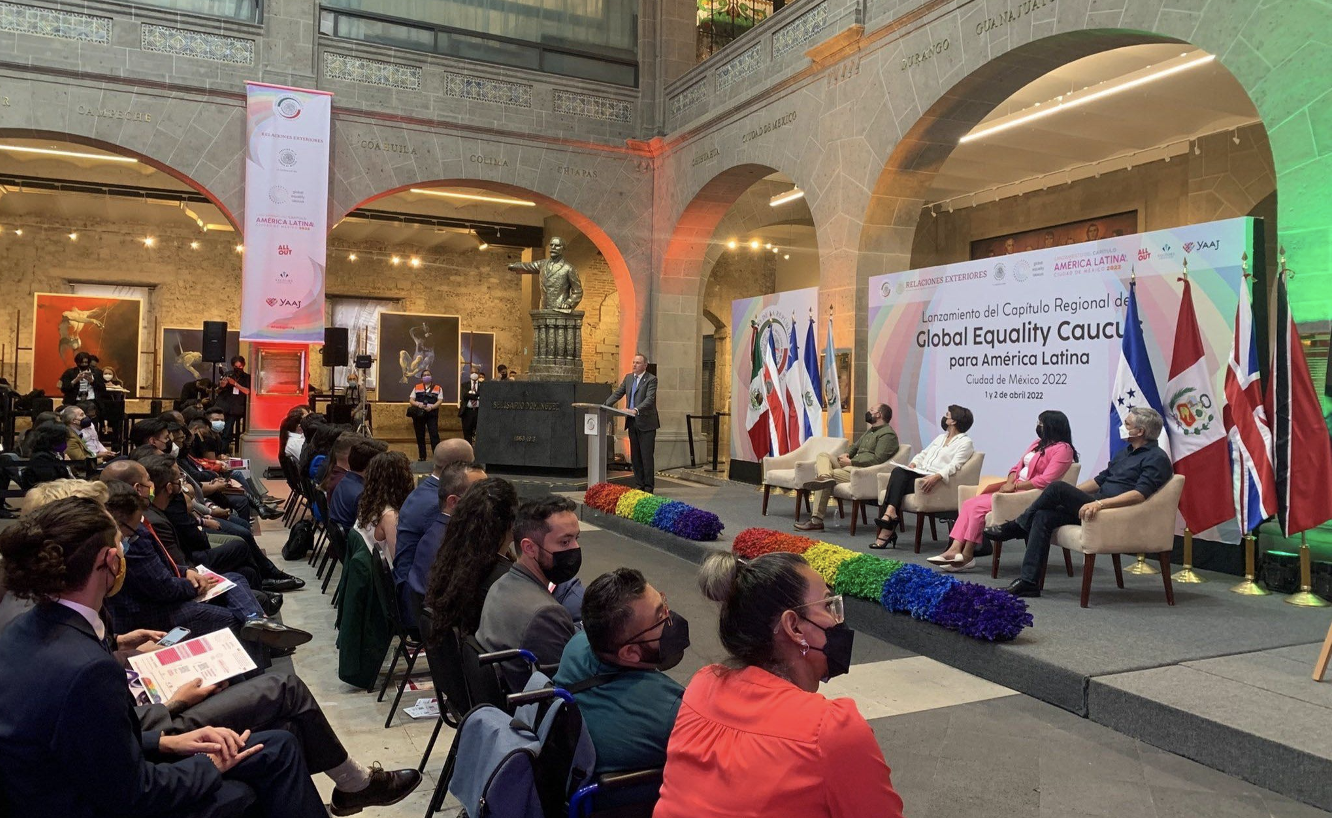Reimagining human rights and the power of LGBT+ mobilization in Latin America: Part 1
archive


Global Equality Caucus Launching of the Latin American Chapter, April 1, 2022
Reimagining human rights and the power of LGBT+ mobilization in Latin America: Part 1
On April 1st and 2nd, the Global Equality Caucus (GEC) launched the Latin American chapter of the coalition in Mexico City, being its first event in the region. Hand in hand with the local Congressman Temístocles Villanueva, and the national LGBT+ organization Yaaj Mexico, the two-days conference included plenary sessions, simultaneous roundtables, the signing of the regional pact against conversion therapies, and the presentation of Mexico as the co-president of the Equal Rights Coalition for the next period of sessions.1 The conference itself signals an interest of the Mexican government (both from offices within the Executive, and federal and local congresses within the Legislative) to mobilize an agenda in favor of LGBT+ rights. However, I want to highlight a larger political process of governance and “counter-conducts” in times where human rights and advocacy, globally and in Mexico, are facing backlash and discontent. These forms of protest and forms of government make evident the importance of communication politics both as a tool to “speaks rights to power” (Brysk, 2013), and as a tool that reworks human rights discourses to demand to be governed differently (Fierro, 2019).
An attempt to start building political will in Mexico around conversion therapies and in overall LGBT acceptance stemmed from the interest of local Congressman Villanueva, an openly gay politician in Mexico City, and Yaaj Mexico, known for their agenda to fight conversion therapy, to sign into the global coalition against conversion therapies. This is a global effort to communicate Mexico's willingness to mobilize the protection of survivors of abuse and torture based on their sexual orientation and/or gender identity (SOG), overcoming the political risks and costs of solidarity of being present and vocal about LGBT rights.
This 3-parts think piece describes what looks like the initial commitment to translate awareness and normative recognition into Mexico’s participation into global action to protect LGBT rights in a country where violence and discrimination continues being a reality. But also, this piece invites to imagine new ways to deploy global technologies of subjectification, such as human rights, as a way to claim rights through rebellious politicization. Alison Brysk lists lobbying, diplomatic intervention, and institutional reform as possible mechanisms showing political will —commitment translated into action (Brysk, 2013: 7). During the conference we saw at least three specific examples of these: 1) Mexico City’s Congressman Temístocles Villanueva lobbying along with Yaaj Mexico to get other politicians commit to fight against conversion therapies ; 2) diplomatic intervention with the participation of foreign embassies in Mexico sharing best practices on legislation and public policies against conversion therapies, and also Mexico becoming the co-chair of the Equal Rights Coalition; and 3) Jalisco’s Director of Sexual Diversity, Andrés Treviño, sharing how they got to reform the Civil Registry offices’ administrative codes to become the first state to guarantee trans youth and adolescents’ right to change their official documentation.
Simultaneously, the conference became a site to rethink rights discourse through reclaiming a broader agenda of social rights that traverse being LGBTI+, or in a Foucauldian framework: a set of counter-conducts —the will not to be governed in a certain way, by a certain group of people, at that price (Foucault 2007: 75). Yaaj’s role in co-organizing the conference allowed to bring forward demands stemming from grassroots movements and the organized civil society. They extended the invitation to activists as panelists and audience members who used those three communication tools, reworked them, and reclaimed their human rights to be governed differently. Through those three processes, activists also voiced at least three needs: 1) to reverse legislation affecting NGOs; 2) reframing what we understand as conversion therapies to secure broader political action; and 3) participation in government offices and political parties. This event was a different turn where grass-root movements and NGOs were working hand in hand with government officials and international organizations by negotiating and collaborating beyond a human rights campaign against conversion therapy and more towards a comprehensive LGBT+ human rights agenda. Activists were conscious of themselves as right bearers and how they could disrupt subjectivities on what LGBT+ people should reclaim as rights to create a rebellious possibility if being governed differently, and not as a consequence of a legal provision.
The three tools of political will that I include showing political will (lobbying, diplomatic intervention and reform) will appear twofold in three think pieces (this being the first one). First, I will describe the ways the human rights campaign of the Global Equality Caucus —the “Regional Pact against Conversion Therapies”— was successful in securing a commitment towards LGBT human rights through a “glocal” political communication campaign. Then, I will show how civil society contested the limits of each of those tools to think about human rights not only as a campaign, but to debate socioeconomic disposability of queer subjectification. It is not enough to have “rainbow quotas”, because people demanded action towards a dignified life. Thinking through Fierro’s research with the workers’ movement in Brazil, people in the Global Equality Caucus conference knew the commitments needed to conduct the tiring fight for LGBT rights (like economic stability, banning conversion therapies and an active voice in political institutions) comes from the consciousness of being right-worthy (Fierro 2019: 402). I do want to clarify that, as Odysseos recognized, we cannot reduce resistance to discernible actions that resist oppression in expressly political registers and in visible and organized forms (Odysseos, 2016: 15). Thus, some of the examples I point to will not seem as “energetic” or “revolutionary” as one would imagine, yet they show counter-conducts to debates that were narrowed down or had silenced queer voices for a long time.
Lobbying against conversion therapies
The inauguration of the Latin American chapter of the GEC gathered legislators from all over the region, Lord Nick Herbert —UK Prime Minister's Special Envoy on LGBT Rights—, and representatives of diplomatic embassies from the Global North. For a long time now, Yaaj Mexico is advocating to pass a national bill to ban conversion therapies. Although they successfully collaborated with Congressman Villanueva to pass the bill in Mexico City, and since then we saw a domino effect in 7 other states,2 the Senate put the nationwide bill “in the freezer”.

(Inauguration of the GEC LatAm chapter. From left to right: Lord Nick Herbert in the podium, Mexico local Congressman Temístocles Villanueva, Senator Patricia Mercado, Federal Deputy Odette Almazán Muñoz, and Mexico City’s Secretary of Work José Luis Rodríguez Díaz de León. Photo by: Global Equality Caucus)
As Brysk argues, in speaking rights to power, the messenger matters (Brysk, 2013: 55). The international standing of the GEC allowed to gather high-level politicians to commit in condemning conversion therapies, and open up the doors to continue working hand in hand with civil society to eradicate them —like Senator Patricia Mercado stated during her speech. The voices of government officials allowed Yaaj’s cause to be embodied by credible figures that can persuade voters and other legislators to stand behind the bill. Secretary Rodríguez, for example, invited the audience to remember LGBT+ people has a voice, being voters who can choose and advocate in decision making within the three branches of government. He aimed to build connections not only with a Mexican audience, but also with the region and the rest of the world. He connected the LGBT+ agenda through a common denominator in Latin America: he argued inequalities in the region should bring together all the attendees to globalize their political will and make an effort to create better life conditions for all. He highlighted the need to think through Mexico City’s experience, but also in a global and national scope that allows to create initiatives reducing gaps with non-LGBT+ people for a dignified life.
Yaaj moderated the plenary session of the day, around conversion therapies and the risks they pose to the rights of young LGBT+ worldwide. They used the panel to bring together local and international activists, artists, and government officials. The same way the messenger matters, the message needs to be persuasive. Yaaj was savvy in continuing to frame the topic of conversion therapies not only as a human right violation, but to highlight it surmounts to torture and cruel treatment. Rhona Goodarzi represented the International Rehabilitation Council for Torture Victims, and along with Ericka Salinas, a Mexican film maker, and Andrés Forero, Campaigns Director of All Out, reminded the audience of how these practices can cause a level of suffering so extreme people may never recover. Naming them torture allows for people who underwent these practices to be frames as survivors, but also as martyrs when the damage leads to suicide. Politicians in the plenary session were vocal about the need to do more lobbying. Senator Mercado proposed activists following Senators to inform them about these damaging practices; for legislators in the Senate to pass the bill before the end of their period; and to move beyond legislation and towards policy making.
The success of this campaign can also be seen through the figure of Congressman Villanueva as a charismatic champion for LGBT+ rights, capable of gathering national and regional support of his peers through legislatures and other government branches. Temístocles Villanueva has positioned himself in the Mexican political landscape as a young politician with fresh views in the ruling party, MORENA. His campaigns and political work pays attention to socioeconomic inequalities and how sexual orientation and gender identity can pose an added layer to achieving human dignity. Working along LGBT+ civil society organizations shows a conscious political will to build an agenda hand in hand with the groups he serves. This gains him legitimacy and reaffirms a powerful message of politics from the bottom up.
Temístocles Villanueva successfully worked with Yaaj and the Global Equality Caucus to communicate two more messages: 1) having an LGBT+ “Latin American perspective” and a “regional responsibility” as a force of political capital; encouraging attendees to see the GEC as a network of political will building on human rights across borders and across the political aisle. The Congressman positioned Mexico as part of Latin America, but also under an identity of a conscious and active Global South. He closed the inauguration with the signature of the commitment by legislators from all across the region to work towards banning conversion therapies, becoming the new champion for the global agenda the Caucus is advocating for. He also used a regional and local agenda to position himself as a strong political figure, even beyond LGBT+ rights, fighting for socioeconomic rights.
Above all, Villanueva did political lobbying to reaffirm the support of other legislators in Mexico and the region to continue cooperative decision making with him as an important figure to look up to. It was also a way for Yaaj Mexico to reaffirm the language in the messaging that would travel through Latin America and globally, now that Mexico is becoming a leader in the Global Equality Caucus. Activists are learning and redeploying in imaginative ways the human rights vernacular as a language for policy demands to push against obstacles in political will. Simultaneously Villanueva secured a regional commitment towards LGBT+ human rights through a “glocal” political communication campaign.
Lobbying against anti-foreign aid bill
Civil society representatives contested the limits of the agenda set for the conference, and the discourse around the human rights campaign that framed the launching of the Caucus’s Latin American chapter. I want to point to the way activists redeployed the human rights campaign that, in a broader sense, aims to secure LGBT+ rights in an encompassing fashion, to debate socioeconomic disposability of queer subjectification (Odysseos, 2016). The particular moment of the conference I’m referring to showed a government policy since the arrival of president López Obrador to power, where deterrents to his project to of a new Mexican nation-state face punishment, including the organized civil society reclaiming against human rights violations. The government is following an austerity policy, stripping away from government funding the civil society that he deems as corrupt, robbing tax payers from actual work that the ruling party claims to be taking care of. Following Odysseos proposal of human rights counter-conducts to resist disposability, we see Obrador’s government to build activists as non-pertinent, minority individuals, disposable subjects of the global political economy (Odysseos, 2016: 5). In response, we see activists recognize state officials as interlocutors, but forces them to act in a different direction.
Different from regular lobbying on the topic at hand, which was conversion therapies, Amaranta Gómez Regalado, a prominent indigenous muxe activists and co-chair of Mexican LGBTTTI Coalition, took the floor during a roundtable with diplomatic representatives and directed her comment to legislator Celeste Ascencio, who was present in the audience. An openly lesbian federal Congresswoman, Deputy Ascencio is an indigenous politician that comes from a rural area from Paracho, Michoacán. Her parents and herself have been part of the MORENA movement and party for a long time. Earlier this year she appeared in news outlets for proposing a bill that forbids CSOs from receiving foreign aid to do lobbying and strategic litigation. She has argued that these organizations were using foreign money to hinder the government’s project for a “Fourth Transformation”, to promote “coups”, and to favor foreign intervention in Mexico (Etcétera, 2022).
Amaranta stood up during the Q&A, and rather than staying in the conversation of sharing best practices to develop public policies around conversion therapy, she reclaimed the right for NGOs to keep working for those public policies to even work. She reworked the conversation away from a top-down approach of globalization (with foreign governments supporting Mexico) to a bottom-up approach (starting from the very local, and moving towards the global when planning and testing these new policies). She used it as an introduction to later on request Congresswoman Ascencio to stop the bill against foreign funding, as it won’t allow for activists to continue their work.
That public confrontation in front of international spectators and nationwide allies made Congresswoman Ascencio publicly agree to do so. In a later panel both of them shared, Gómez Regalado reiterated the commitment Congresswoman Ascencio did. Despite it being out of the topic, Amaranta positioned an agenda that reclaimed against being disposable subjects, in Odysseos terms. But as Fierro argues, activists use constitutional social rights as a strategy of counter-conduct, as the law determines dignified work, and the political project of MORENA is all about horizontality and citizen’s political participation. By pushing against the liberal governing technology of the control on foreign aid, as well as the control over national funds for civil society’s work, the LGBT+ coalition Amaranta represents explored new sites to contest and lobby, even if not initially designed for that.
The human rights campaign the Global Equality Caucus is aiming to succeed for (a coalition of legislators signing to forbid conversion therapies) didn’t suffer any setbacks, yet the victories went beyond the scope of action the Caucus aimed for. As I stated in the introduction, actions of resistance to oppression don’t have to be energetic or revolutionary understood solely as incendiary. The counter-conduct of Amaranta opened up a debate and allowed her to voice the concerns not only of queer activists, but for the organized civil society in Mexico.
Note: This is the first out of three parts on a think piece on how to imagine new ways to deploy human rights as forms of rebellious politicization. The three parts of this project refer to Latin American LGBT+ as a case study, and particularly to the results of the launching of the Latin American chapter of the Global Equality Caucus.
1. The Equal Rights Coalition is an intergovernmental body that has 42 member states and aims to protect the rights of LGTBI people.
2. Baja California, Baja California Sur, Jalisco, Colima, Yucatán, Zacatecas, and Mexico State.
This bibliography includes the cited works from the three parts of this think piece:
Asl, Moussa Pourya. 2018. “Practices of Counter-Conduct as a Mode of Resistance in Middle East Women’s Life Writings” 24 (2): 194–205.
Brysk, Alison. 2013. Speaking Rights to Power: Constructing Political Will. Oxford University Press.
Death, Carl. 2010. “Counter-conducts: A Foucauldian Analytics of Protest”. Social Movement Studies 9 (3): 235–51.
Etcétera. 2022. “Diputada de Morena busca prohibir fondos extranjeros para asociaciones que litigue y cabildeen”. Etcétera. https://www.etcetera.com.mx/nacional/diputada-morena-fondo-extranjeros-asociaciones-litiguen/
Fierro, Alberto. 2019. “Revolutionary Politics of Social Rights? An Ethnographic Account of the Homeless Workers’ Movement in São Paulo”. Millennium: Journal of International Studies 47 (3): 398–416.
Foucault, Michel. 2000. Power. Essential Works of Foucault, 1954-1984 ; v. 3. New York: New Press.
Foucault, Michel, Sylvère Lotringer, y Lysa Hochroth. 2007. The politics of truth. Semiotext(e) foreign agents series. Los Angeles, CA: Semiotext(e).
Kapur, Ratna. 2018. Gender, alterity and human rights: freedom in a fishbowl. Elgar studies in legal theory. Northampton, MA: Edward Elgar Pub., Inc.
McNeilly, Kathryn. 2019. “Are Rights Out of Time? International Human Rights Law, Temporality, and Radical Social Change”: Social & Legal Studies 28 (6): 817–38.
Odysseos, Louiza. 2016. “Human Rights, Self-Formation and Resistance in Struggles against Disposability: Grounding Foucault’s ‘Theorizing Practice’ of Counter-Conduct in Bhopal”. Global Society 30 (2): 179–200.
Secretaría de Relaciones Exteriores. 2016. “México presenta su solicitud para ingresar al Grupo Núcleo de Naciones Unidas sobre derechos de la Comunidad LGBT”. Gobierno de México. May 31, 2016. http://www.gob.mx/sre/prensa/mexico-presenta-su-solicitud-para-ingresar-al-grupo-nucleo-de-naciones-unidas-sobre-derechos-de-la-comunidad-lgbt.



